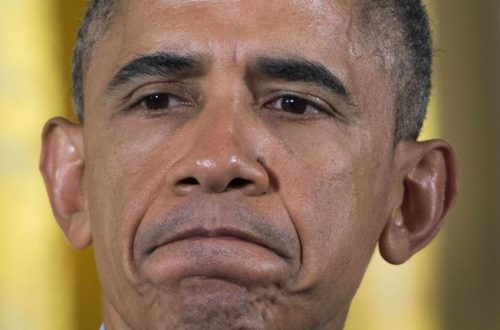A Growing Threat, But a Dithering President
Obama has no long-term strategy for combating the Islamic State group.
By Peter Roff
The politicians in Washington for whom President Barack Obama sets both the tone and tempo are talking too much about world events while not doing enough.
The threat coming from the Islamic State terror group is just one of several for which the United States has no long-term strategy for dealing. The blame for this lies squarely at the president’s feet. He is the commander-in-chief; it is an essential part of his job to ensure the country remains safe from its enemies.
It’s not just that the Islamic State group’s activities threaten vital U.S. interests – which they clearly do; it’s that a new caliphate stretching from the extremes of southwest Asia to the Atlantic Coast of North Africa would lead to an almost certain perpetual conflict that would make some people long for the comparative clarity, relative peace and stability that marked the Cold War.
The country is not with the president on his handling of the crisis. The latest CNN/ORC poll showed 57 percent of Americans disapprove of his handling the threat the Islamic State group poses which, the network advises, is “a significant decline in support for the President over the past few months.”
Obama’s State Department is no better, having taken the apparently official position that America cannot “kill our way” out of the Islamic State group’s conflict with the West. It’s a ridiculous response to an even more ridiculous assertion no one has made. Officialdom flounders, suggesting “jobs” as the cure all – and perhaps hinting that yet another stimulus package in is the works.
Meanwhile, too few too people outside the government are talking about the need for a cohesive, long-term strategy that can be built around a sort of broad consensus. Just as the British political class ignored Churchill’s warnings about Hitler, those who sound the alarm now are getting little attention inside the nation’s capital.
Whether this neglect is willful or merely woeful, there are those who will not be deterred. One of them is former House Speaker Newt Gingrich who, in a late January speech to the Iowa Freedom Summit delivered a powerful indictment against the current state of affairs.
“This is a global war,” Gingrich said before railing against the politicians in both parties who fail to recognize it as such. “There are thousands of jihadists who have come to Northern Syria from all around the world. Over a thousand from France alone. Over 600 from Great Britain. Over 100 from the United States.”
“In Nigeria, Boko Haram has 10,000 fighters. And last year Boko Haram killed more people than Ebola,” he continued, “But, the State Department, for years, under Secretary Clinton, wouldn’t even list them as a terrorist group. Even though, their initial base camp was called ‘Afghanistan’, in honor of the Taliban.”
The recent mass beheading of Coptic Christians in Libya seems to confirm the former speaker’s analysis. The West may not be engaged in a war arising out of religious differences, as Obama seemed to suggest in his remarks to the National Prayer Breakfast, but the various terror groups in the Middle East, Southwest Asia and northern Africa most certainly are. The question no one in a position of authority appears ready to answer, however, is how the United States and the world’s other democracies should deal with this fact over both the short and long term.
The answer, Gingrich said, is “to recognize this is as intellectually significant a fight as the development of anti-communism was between 1945 and 1950.”
Many excellent books have been written on this period (including Dean Acheson’s “Present at the Creation,” which is probably my personal favorite). Policymakers would do well to reread some of them now in order to better understand the monumental nature of the clash before us, and to be able to better distinguish between the real objective and those enunciated by the fantasists and frauds who are engaged currently in a hunt for mythological moles making up an imaginary fifth column infiltrating both major political parties and the national security establishment.
A broad approach is required, much as was the case in fighting Soviet expansionism in the earliest days of the Cold War. “This is a campaign that should be fought with the largest possible number of allies. It’s a campaign which should be fought wherever possible,” Gingrich proposed, “by surgically and methodically hunting down the people” who believe they must kill us while preparing to live in peaceful coexistence with those who are willing to live in peaceful coexistence with us.
In the end it is a matter of determining who is for us, who is against us and who is on the fence – vulnerable to radicalization yet open to education and alliance. The fact that Jordan and Egypt have stepped up in the war on the Islamic State group is an important signal to the West that allies are present, they do exist and must be cultivated. Many of the tactics that produced the early victory will be useful again. It requires someone to do the hard work of pulling it all together, whether inside the government or out, inside the United States or out.
The stakes are too high for the president to be allowed to continue to fall from one crisis into another; Congress and those who constitute the remains of what was once fondly and then derisively referred to as “the Establishment” must step up to help him – by leading him around by the nose if necessary until he makes the right decisions.
U.S. NEWS

